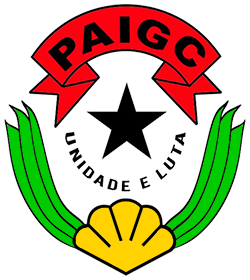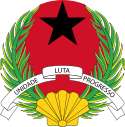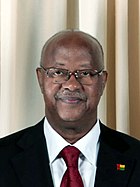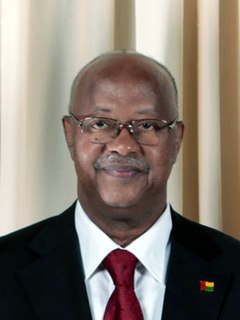Guinea-Bissau was dominated by Portugal from the 1450s to the 1970s; since independence, the country has been primarily controlled by a single-party system.

Politics of Guinea-Bissau takes place in a framework of a semi-presidential representative democratic republic in transition, whereby the President is head of state and the Prime Minister is head of government, and of a multi-party system. Executive power is exercised by the government. Legislative power is vested in both the government and the National People's Assembly.
This name uses Portuguese naming customs: the first or maternal family name is Artur and the second or paternal family name is Sanhá.

Kumba Ialá Embaló, also spelled Yalá, was a Bissau-Guinean politician who was president from 17 February 2000 until he was deposed in a bloodless military coup on 14 September 2003. He belonged to the Balanta ethnic group and was President of the Social Renewal Party (PRS). In 2008 he converted to Islam and took the name Mohamed Ialá Embaló. He was the founder of the Party for Social Renewal. In 2014, Ialá died from a cardiopulmonary arrest.

The African Party for the Independence of Guinea and Cape Verde is a political party in Guinea-Bissau. Originally formed to peacefully campaign for independence from Portugal, the party turned to armed conflict in the 1960s and was one of the belligerents in the Guinea-Bissau War of Independence. Towards the end of the war, the party established a Marxist–Leninist one-party state, which remained intact until multi-party democracy was introduced in the early 1990s. Although the party won the first multi-party elections in 1994, it was removed from power in the 1999–2000 elections. However, it returned to office after winning parliamentary elections in 2004 and presidential elections in 2005, since which it has remained the largest party in the National People's Assembly.

Elections in Guinea-Bissau take place within the framework of a multi-party democracy and a semi-presidential system. Both the President and the National People's Assembly are directly elected by voters.

Presidential elections were held in Guinea-Bissau on 19 June 2005, with a second round runoff on 24 July. The elections marked the end of a transition to democratic rule after the previously elected government was overthrown in a September 2003 military coup led by General Veríssimo Correia Seabra. The result was a victory for former President and independent candidate João Bernardo Vieira.
The Party for Social Renewal is a political party in Guinea-Bissau. It is one of the country's leading parties and is currently the main opposition party.
Ansumane Mané was a Bissau-Guinean soldier who led a 1998 uprising against the government of President João Bernardo Vieira, which caused a brief, but bloody civil war.
Manuel Saturnino da Costa is a Guinea-Bissau politician who served as Prime Minister of Guinea-Bissau from 26 October 1994 to 6 June 1997.

Raimundo Pereira is a Guinea-Bissauan lawyer and politician who was interim President of Guinea-Bissau from 3 March 2009 to 8 September 2009 and again in 2012, following the departure of President Malam Bacai Sanhá for medical treatment abroad; he continued in that capacity after Sanha's death. Pereira was elected as President of the National People's Assembly on 22 December 2008. Pereira is a member of the African Party for the Independence of Guinea and Cape Verde (PAIGC). He was ousted in a coup on 12 April 2012 and succeeded by Mamadu Ture Kuruma.

Presidential elections were held in Guinea-Bissau on 28 June 2009 following the assassination of President João Bernardo Vieira on 2 March 2009. As no candidate won a majority in the first round, a second round was held on 26 July 2009 between the two leading candidates, Malam Bacai Sanhá of the governing African Party for the Independence of Guinea and Cape Verde (PAIGC) and opposition leader Kumba Ialá. Sanhá won with a substantial majority in the second round, according to official results.

General elections were held in Guinea-Bissau on 28 November 1999, with a second round for the presidential election on 16 January 2000. The presidential election resulted in a victory for opposition leader Kumba Ialá of the Party for Social Renewal (PRS), who defeated Malam Bacai Sanhá of the ruling African Party for the Independence of Guinea and Cape Verde. The PRS were also victorious in the National People's Assembly election, winning 38 of the 102 seats.

General elections were held in Guinea-Bissau on 13 April 2014, with a second round for the presidential elections held on 18 May since no candidate received a majority in the first round. Several logistic problems and delays caused the elections to be repeatedly postponed, having initially been scheduled for 24 November 2013 and then 16 March 2014. In the second round, José Mário Vaz of the African Party for the Independence of Guinea and Cape Verde was declared the president-elect with 62% of the vote.

José Mário Gómes Vaz is the President of Guinea-Bissau, in office since 23 June 2014.
Francisca Maria Monteira e Silva Vaz Turpin, better known as Zinha Vaz, is a Bissau-Guinean women's rights activist and politician. She has been a member of the National People's Assembly for several terms for the Resistance of Guinea-Bissau-Bafatá Movement, as well as a presidential advisor. In 1999 she served for a brief time as mayor of the capital city Bissau. She was jailed for political reasons for three years during the 1970s and in 2003 again for several days. Recently she was ambassador to Gambia.
The following lists events that happened during 2012 in Guinea-Bissau.













